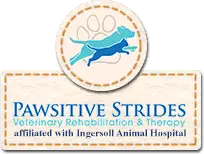!Request Appointment Button
!Header Buttons Right Side
Chiropractic
Animal Chiropractic Care in Des Moines
(or Veterinary Spinal Manipulation Therapy)
Ingersoll Animal Hospital is proud to announce that VSMT is now available for our patients. VSMT is often referred to as “chiropractic care for animals.” Dr. Nancy Peterson is currently conducting VSMT evaluations and adjustments. She is adjusting current clients as well as pets referred from other practices. Dr. Peterson attended and received certification from the Healing Oasis Wellness Center in Wisconsin through its nationally accredited and State Board of Education approved Veterinary Spinal Manipulative Therapy courses. She is also a member of the College of Animal Chiropractors. Dr. Peterson participated in over 260 hours of intensive coursework in small animal and equine anatomy, functional neurology, and spinal adjustment techniques. Dr. Peterson is offering VSMT/chiropractic adjustments for cats and dogs.
What is Veterinary Spinal Manipulation Therapy?
Animals are particularly sensitive to spinal stress, which can come from both internal and external environments. These stresses can cause decreased mobility in particular areas, resulting in abnormal nerve impulses and pain(referred to as hypomobility or subluxation). The nervous system is intimately associated with the spine, so any abnormality in the spine can adversely affect the nervous system and vice versa. The basic premise of VSMT is to correct vertebral subluxation/hypomobility, therefore increasing the health of the nervous system and the overall health of the animal.
Adjustments may be used to help maintain a pet’s health or to help with acute or chronic musculoskeletal problems (i.e. intervertebral disc disease, muscle spasms, arthritis, degenerative joint disease and back pain, or certain neurological conditions). In addition, many senior patients benefit from regular spinal adjustments for pain relief and improved quality of life. VSMT adjustments can be very helpful for canine athletes, whether in formal competition or running at the park.
Why would I consider Veterinary Spinal Manipulation Therapy services for my pet?
Common candidates for chiropractic care include patients exhibiting:
- Back, neck, leg, or tail pain (including chronic pain)
- TMJ problems
- Sports injuries
- Muscle spasms
- Nerve problems
- Incontinence
- Senior pain or stiffness
- Lameness not associated with fractures
- Lick granulomas
What happens at a Veterinary Spinal Manipulation Therapy appointment?
A VSMT exam includes a complete physical exam, neurological exam, and motion palpation. In addition, a complete patient history will be taken to assess the pet’s activity level and goals. Depending on the findings, X-rays or other testing may be needed before the adjustment occurs.
VSMT adjustment consists of high velocity, low amplitude, controlled hand thrusts. They are directed at a specific joint in a specific angle to correct vertebral subluxations or hypomobility.
How does Veterinary Spinal Manipulation Therapy work?
Spinal bones and joints are maintained in a specific alignment by the nervous and musculoskeletal systems. The joints of the spinal column need to move correctly to maintain the overall health of the spine and, thus, the entire nervous system. The nerves that surround each joint and vertebral area are in constant communication with the brain, central nervous system, and other organs. Even subtle changes in this alignment can cause problems. Because of the connectivity of the spinal column to the central nervous system, subluxated or hypomobile areas can affect not only their immediately surrounding areas, but also distant organs and body functions. The goal of an adjustment is to restore your pet’s nervous system to its optimal health and function.
Will an adjustment hurt my pet?
Most dogs and cats accept both the exam and adjustment without signs of pain. Should a painful area be found, Dr. Peterson will use the gentlest techniques to reduce pain before any adjustment. In specific cases of acute or extreme pain, Dr. Peterson may split the complete adjustment into separate visits to achieve the best results. Your pet may show some signs of soreness for a couple of days after an adjustment. This is due to motion being restored to an area that may not have moved normally for quite some time. This is similar to us exercising suddenly after prolonged inactivity and the muscle soreness that results from the sudden, unaccustomed movement.
How often will my pet need an adjustment?
The frequency of adjustments will vary from pet to pet. Adjustments may begin weekly for acute injuries. Senior patients typically make visits every 4-6 weeks. Healthy, young pets oftentimes are seen every 3 months for maintenance.
The goal of VSMT and chiropractic treatment is to address neurological dysfunction in the spine and restore mobility. The muscles and ligaments need to learn to support the spine and maintain this newly realigned position. An animal chiropractor will adjust and correct the animal a number of times, until the body accepts the new position of the spine as normal and the muscles and ligaments can support and maintain this position.
Dr. Peterson looks forward to providing this service to your pets. If you are interested in scheduling an appointment for animal chiropractic care in Des Moines, or if you have more questions, please feel free to call our office at (515) 274-3555.



